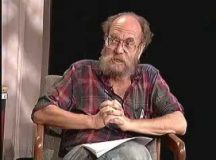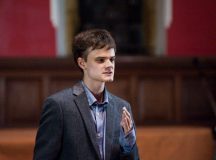Oren Ben-Dor is a Professor in the University of Southampton’s Law School, and co-organiser of a controversial conference on International Law and the State of Israel. The recent cancellation of the conference – following the University’s withdrawal of permission for it to be held – proved equally controversial. Whether or not one thinks the event should have gone ahead, the views of those associated with it certainly bear scrutiny. The conference’s defenders have argued that universities should be places where even the most challenging ideas can be aired freely. Some of Ben-Dor’s views certainly fit into the ‘challenging’ category. They are critically appraised here by Professor Sarah Brown.
An article Oren Ben-Dor published in 2012 in the Edinburgh University Press journal Holy Land Studies provides some useful insights into his views. Although it appeared in a scholarly journal and, at least superficially, follows the conventions of academic writing, ‘Occupied Minds: Philosophical Reflections on Zionism, Anti-Zionism and the Jewish Prison’ is heavily dependent on a kind of rhetorical phantasm, built up through a series of mysterious, veiled suggestions. In the abstract Ben-Dor refers to ‘pathologies pertaining to Jewish being and thinking.’ This essentialising formula in itself is problematic, but Ben-Dor transmutes it into something far more sinister over the course of the article: a nameless, shapeless, lurking horror.
The essay begins with a comparatively objective discussion of terminology, but then takes an odd turn: ‘Justice can be broadly understood as being about giving back what is due. My concern is with what is the primordial due to be given back in Palestine? Can legal, constitutional, even moral, talk respond to the primordial due that calls for the thinking of Palestine?’ (34).[1]
The sentences don’t seem to parse easily. But the repeated use of the word primordial – ‘ancient’, ‘primeval’– already suggests that more than the events of 1948 are at stake here. He goes on to say that in order to work out what is really due to Palestine we need to think about it in a way which is ‘still being policed out from thought’ (35). He repeatedly warns that ‘political correctness’ is inhibiting an honest discussion of the issues. However, harsh criticisms of Israel and Zionism are commonplace – so what exactly is he claiming to be unthinkable here?
Gradually, over the course of the article, the author’s real views emerge with startling clarity. But at first they remain hidden from view: ‘Is Zionism to be pointed at as the origin of the injustice in Palestine, or should Zionism be approached symptomatically – as an indicator to a more primordial and self-concealed injustice which is itself existential in nature and which is determinative of actuality there?’ [Emphasis added; 35]
The reader might assume that this is an allusion to the injustice of antisemitism. (Sometimes the Palestinians are described as secondary victims of the Holocaust). But for Ben-Dor the real injustice is in fact the ‘endemic otherness and exile of Jewish being and thinking’ (35), a view which is followed through to its logical, and shocking, conclusion.
Like Gilad Atzmon, author of The Wandering Who? A Study of Jewish Identity Politics (2011), Ben-Dor targets Jewish anti-Zionists as part of the problem. He warns that normal left-wing frames of reference – those of Marxism or Postcolonialism for example – are inadequate to counter Zionism. In doing so, he implies that some anti-Zionists have a self-serving and secretive agenda: ‘Grasped existentially, all these frameworks are conjured up to conceal the possibility that the injustice of Zionism is invoked for the sake of covering up some deeper unfolding that implicates human thoughts more generally’ (36).
The constructions are passive, but agency is still strongly suggested; the phrase ‘deeper unfolding’ seems to indicate a long-laid plan, carefully concealed.
Ben-Dor then hints further at what motivates Jewish anti-Zionists:
‘For anti-Zionism to press the moral demand for change according to an egalitarian constitutional rationale and framework – whereby all colonial racist Israeli laws are abrogated and the Jewish state replaced – might not find connective tissue to the mindset of both political Zionists and of those on the left who oppose Zionism as Jews. Nor would it take seriously the mindset of religious Jewish orthodox opposition to Zionism. Anti-Zionism, then, should be able at the very least to articulate and to critically respond to that in the service of which both Zionists and their Jewish objectors from the left and the right are existentially united’ [Emphasis added; 36].
Yes, Orthodox opponents of Zionism have primarily theological motives for their position. But secular Jewish anti-Zionists do want the kind of one-state solution he describes in that first sentence. Ben-Dor seems more interested in dark suggestion than in argument or proof; here he hints at a menace which can barely be expressed. There’s a kind of ellipsis in the final sentence – we probably expect ‘that’ to qualify some other word. But it remains simply ‘that’, the unnamed force which supposedly binds all Jews together, whatever their political differences. This is of course a profoundly conspiratorial, as well as completely unevidenced, perspective. The word ‘service’ further implies the power of ‘that’ – whatever ‘that’ may be – and taps into the trope of Jewish dual loyalties.
On the next page he introduces, via cryptic insinuation, a view which he will develop more openly later in the essay – the idea that Jewish identity is anti-human, and might even be invoked as a key driver of the Holocaust: ‘It is thought-provoking that the debt in Palestine that is owed, not only to Palestinians but to humanity as a whole, is not being thought-about’ (37).
It would seem that the whole world, not just the Palestinians, is a victim of ‘that’. He continues: ‘The very persistent use of the Jewish Question by Zionists should have provoked the contemplation of whether Zionism is not itself a historical manifestation, as well as a means for the uncanny regeneration and preservation of that Jewish being and thinking that keeps re-igniting that Jewish Question. But it does not, or rather is not allowed to’ (37).
Rather than seeing Zionism as, in part, a response to antisemitism, Ben-Dor seems to view it as a manifestation of a mysteriously potent force, something which inevitably prompts the ‘Jewish Question’, i.e. prompts antisemitism – later he refers to the ‘self-provoked hatred against Jews’ (39). ‘Uncanny regeneration’ is another charged phrase, echoing images of the Jew as a blood-sucking vampire. These intimations of something supernatural at work are congruent with a pervasive tendency to couch criticism of the Jewish Other in mystical or theological terms, crediting Jews with more than human powers. Susan Shapiro explains the origins of this trope in Christian antisemitism and the legend of the Wandering Jew: ‘The Jewish Uncanny represents the Jew(s) as spectral, disembodied spirits lacking a national home and, thus, as unwelcome guests or aliens wandering into and within other peoples’ homes, disrupting and haunting them, making them “Unheimliche,” unhomey.’[2]
Ben-Dor returns to this suggestion of something supernatural at work here: ‘We must connect to what is, but not the “is” of the unjust acts but the “is”, the deepest “is” that connects to the “how” of the people who perpetrate, justify and rationalise these acts. That which stealthily causes such perpetration and rationalisation has already unfolded in a way that representations of the acts themselves do not perturb’ (37).
The final sentence is typically opaque, but once again the subject is a ‘That’ which is ‘unfolded’, and which acts ‘stealthily’. As elsewhere, it’s not clear whether Ben-Dor is describing consciously underhand moves from individuals, or simply personifying a mysterious underlying cause. But the latter interpretation is equally troubling, as it reinforces that uncanny suggestion of something more (or less) than human, the combination of power and secrecy promoted by the idea of the Ewige Jude, the Eternal Jew.
He then characterises what is wrong with Jews, inexplicably but ominously, as a ‘gap’ (36), before yet again hinting that Jews caused or even in some sense sought the Holocaust because of their ‘paradoxical nature of being and thinking that persists and is strengthened by the success of generating hatred and violence against itself’ (38). On the following page Jewish anti-Zionism is described as a ‘camouflaging vehicle’ for what Ben-Dor sees as the true evil, and the loaded word ‘camouflage’ is used twice more in the article. The idea of a ‘gap’ recurs also. Later we are told of the ‘self-imposed forgetfulness of a hole in their own being’ (44). This suggests some strange inherent moral defect or twist.
Ben-Dor continues with this dehumanising theme, a staple of antisemitism of course:
‘The Zionist victim and supremacist mentality – that living force and unity which is nourished by the desire to be hated – stems, before all else, from sublimated hatred of, and supremacy towards, all “others”. It is a mentality that forces separation from the essential, mysterious togetherness that is bestowed on all others. (…) Hatred of all others is a manifestation of self-hatred which is itself symptomatic of an unresolved trauma and separation from some basic human ability, some basic response-ability of humans to mirror, to be responsible and first and foremost to dwell together, accepting ultimately the interconnectedness of, and compassion between, all beings’ (44).
One feature of Ben-Dor’s article is that, just when one feels it cannot get any more abhorrent, new depths are plumbed. It is a commonplace of anti-Israel discourse to make taunting comparisons between Jews and Nazis, to draw a parallel, for example, between the Warsaw Ghetto and Gaza. Here, this trope is intensified into a more twisted suggestion that antisemitism is a function of becoming ‘Jewified’. Rather than suggesting that Jews are turning into Nazis, Ben-Dor suggests that Nazis in fact turned into Jews:
‘Those assimilated into this kind of thinking desire to do the assimilator that which would nourish the assimilator’s desire to be hated. In other words, when those assimilated, unconsciously, do not like what is being done to them in a self-concealing way, they too start to hate themselves for being so assimilated they turn into ‘Jews’, or become Jewified, and in return hate the assimilator in what superficially lends itself to a simple racist discourse and which, in turn, serves the assimilator’s pathology’ (46).
And here the same idea is hinted at – yet again the root of the problem (whatever precisely it is) is referred to simply as ‘that’.
‘The philosophical and existential inquiry asks how enlightened existence has nevertheless managed to attract so much hatred and violence whether in Palestine as the ‘paragon of democracy in the Middle East’ or as a central pillar of German culture before ‘the Holocaust’. What is that which gets stronger in generating so much hatred against itself again and again wherever it is?’ (52).
The current situation in Israel/Palestine and the case of 1930s Germany are forced together in order to suggest that there is something inherent in the Jewish mindset or condition which inspires hatred and perversely feeds on that hate. Here the point is made still more explicit – the Jews, or Jewishness, were the cause of the Holocaust. Again the rhetoric works to indicate that this destructiveness is essentially uncanny, something which cannot be pinned down or controlled. ‘[L]iberal Zionists grasp somewhere in their unconscious … that the Holocaust occurred because of something that haunts Jewish being and thinking, something that cannot be tamed’ (53).
This sense of something uncanny at work, something which haunts, is reinforced by Ben-Dor’s almost hypnotic compulsion to repeat certain words and ideas, for example in this sentence which asserts that Jewish anti-Zionism is part of ‘that’ problem, shielding Jewishness from criticism through cunning subterfuge: ‘Furthermore, could it be Jewish precisely because cloaking the well-concealed Jewish pathology of Zionism behind comforting ethical and universal Jewish ethics creates the existential camouflage that enables pathology to survive and to unfold so successfully?’ (48).
‘Pathology’ (or related words) is used 40 times, the verb ‘unfold’ 15 times, words relating to ‘concealment’ 29 times.
Towards the end of the essay we return to the word ‘due’, used oddly in the opening sentences in relation to the rights of Palestinians: ‘Left Jews who oppose Zionism would sing in one voice with liberal Zionists by being the first ones to condemn as anti-Semitic any person who dares to claim that “the Holocaust” might have been provoked by Jewish being and thinking and that some due has been given back in the form of one of the most horrible of genocides. Anti-Zionist Jews would be the first to condemn as anti-Semitic anyone who says that Jewish being and thinking brought, as its Being demands, violence and hatred upon itself, and that the same being and thinking preserves itself in the realisation of Zionism, the result of a successful concealment of the Holocaust’s origin’ (54).
Ben-Dor offers no apology for claiming that the Holocaust was ‘provoked’ and his use of the word ‘due’ suggests the idea of a just retribution for Jewish culpability. The suggestion that Jewish ‘Being’ inevitably attracts violence and hatred resonates with earlier discussions of such issues, for example this passage from the Nazi journalist Dietrich Eckart: ‘If he is not commanded to stop he will annihilate all humanity. His nature compels him to that goal, even though he dimly realizes that he must therefore destroy himself … To be obliged to try to annihilate us with all his might, but at the same time to suspect that that must lead irrevocably to his own destruction. Therein lies, if you will, the tragedy of Lucifer.’[3]
And in this passage from Ben-Dor’s article even the Holocaust itself becomes a kind of monstrous entity – uncanny, camouflaged, self-serving: ‘The Holocaust is a sublime and uncanny event. There is something so Jewish in the Holocaust as well as in those who perpetrated it. The being of the Holocaust may well so perfectly self-conceal – quintessentially for the sake of Jewishness. There is signification to humanity of such expression of megalomanic hatred towards the phenomenon of the ultimate other. This other utilises this hatred through memorialising it as mere racism thus stealthily preserving that which is concealed and which is fateful to recur through hatred-inducing and righteous Israeli polity’ (55).
With so much else at work in that passage, one might overlook the casual suggestion that the Nazis were themselves somehow ‘Jewish’. But Ben-Dor develops this theme more explicitly here: ‘“The jews” can encompass all those who were stealthily assimilated into the pathology of hatred that nourishes victimhood and chosenness, even if they are not actually Jews … Based on this understanding, existentially, “jews” includes the Nazis, those very perpetrators of violence against the Jews who nourished the phenomenon of denial and thus persistence of the condition’ (61).
For Ben-Dor there is something mystical or even apocalyptic about the phenomenon he is describing. In the final pages he hints at some momentous cataclysm to come: ‘Some conflict that will engulf all humanity is to come through the denial at the heart of the left Jewry reaction to Zionism … As “the Holocaust” shuts down thinking of its own origin, its service to this dark prophecy in the shape of derivative left reaction to Zionism is rendered. There is prophetic force to the denial that unites the left reaction to Zionism. The Jewish Question refuses to be tamed in a national project that nevertheless manages to protect its own survival’ (59).
This is the last of many references to the impossibility of ‘taming’ the supposed problem as though it were a monstrous creature. Over the course of the article the coldly clinical wording of the opening abstract – ‘pathologies pertaining to Jewish being and thinking’ – has been alchemised into something more like the ‘rough beast’ in Yeats’s millenarian poem The Second Coming.
[1] Oren Ben-Dor (2012), ‘Occupied Minds: Philosophical Reflections on Zionism, Anti-Zionism and the Jewish Prison’, Holy Land Studies 11.1. pp.33-62.
[2] Susan Shapiro (1997), ‘The Uncanny Jew: A Brief History of an Image’, Judaism 46, 63-78, p. 65.
[3] Quoted in David Redles (2005), Hitler’s Millennial Reich: Apocalyptic Belief and the Search for Salvation, New York: New York University Press, p. 61.




































